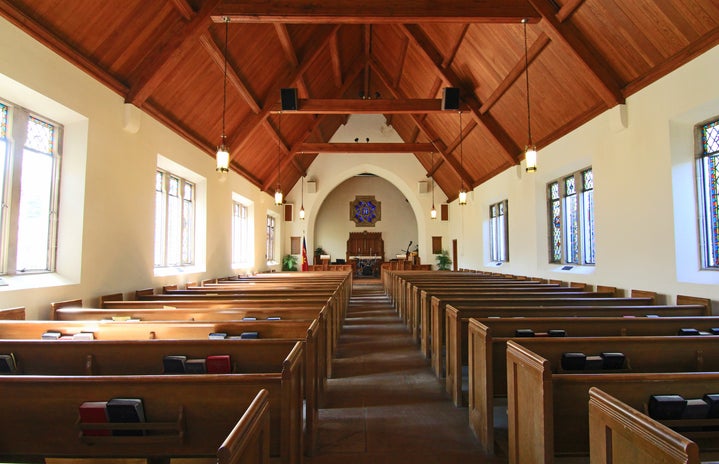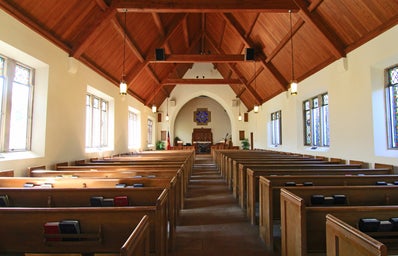Trigger Warning: This piece contains a discussion about sexual assault.
I wish I had learned and heard more about identifying unhealthy relationships as a young teenager in the church. The only relationship advice I would hear is the usual: “Don’t have sex before marriage.” While purity is an important teaching in the church, I feel that there should be more honest and transparent conversations about setting emotional boundaries and how to carry out healthy relationships.
Every religious setting is different, some do have those essential conversations on healthy dating and marriage, but some quite literally enable physical and emotional abuse. Anyone who has not witnessed or experienced the former, can find this quite shocking. This problem does not only lie within the Christian community. I have encountered people from different faiths that observe this pattern as well, but this article will focus on what I have personally seen and experienced as a Christian who was once clueless about the dating scene.
When I spent several years of my childhood and adolescence in a Christian school in Haiti, I was told by two mentors that women should remain in marriages where they have been cheated on or even abused, and to pray that their spouse changes rather than pursuing divorce. The former is not a representation of the school’s collective belief, but how harmful it certainly is when there are people in leadership positions who teach these lessons across faith-based institutions. While I disagreed with these teachings, as a young girl I did not realize that they unconsciously shaped how I would see my worth in future relationships and the lack of emotional and physical boundaries I would establish.
In high school I would settle for situationships where there was no label or relationships where I was cheated on. This enabled heartache and I did not know how to walk away from these situations. Oftentimes religious environments just find the whole topic of dating taboo, so rather than seeking wise counsel, young people are left feeling alone and clueless, making decisions they can go on to regret. And toxic purity culture is so prevalent in the Christian community that this community uses fear and shame tactics rather than talking about how to set healthy physical boundaries and when there are talks about sex, nothing is said about coersion or resources for sexual assault victims.
The taboo in religious settings on conversations surrounding relationships and sex, also is a factor in many men and women not being able to identify sexual assault. There were moments in high school and college, that I did not know what was happening to me was not consensual or I did not want to admit it. I had internalized making excuses for the other person, because purity culture in the church taught young girls that whatever happened to them was their fault. And when talking about hookup culture or even the dating scene, the reality is that there is this expectation of an instant bounce-back from the deepest of traumas. Those who have been sexually assaulted, often feel that they are immediately excluded from the dating scene, because it is so hard to find a partner that will respect your physical boundaries, take it slow and truly validate your emotions regarding your trauma. Often what we see is the complete disregard of our past negative sexual experiences.
Months ago I voiced my physical boundaries to someone and they called me selfish for not moving further with them. This person knew the reasoning behind them, and all they could care about was that they were not going to get any that night. Experiences like these cause people to not put themselves out there, they go on to believe that they are not worthy of a relationship if they establish any physical or emotional boundaries or that they will not find a romantic interest. But just because it is hard, does not mean you should settle. Respecting physical and emotional boundaries is the bare minimum, you deserve nothing less. If you are worried that being transparent about your standards will limit your choices, you should be more concerned that you are willing to lower those standards and settle, to end up with someone who never valued what is important to you.
I do not have it all figured out. I am still learning about my own love language and boundaries. Those boundaries might change over time and that is okay. All I know is that I am only willing to be with someone that respects them. It is my hope that everyone across faith-based institutions unlearn the notion that they should tolerate abuse, unfaithfulness and gaslighting in hopes that the other person will change.
While there certainly needs to be more talk in the church about identifying toxic relationships, I feel that we should also encourage others to not settle for just a good relationship, but be patient in the waiting season to receive what is meant for us. Not so long ago, I was listening to Jeanine Amapola’s Happy and Healthy podcast episode on “The Dating Mistakes You Should Avoid” and she mentioned how we can go on to believe someone is good for us, but are they God’s best? This approach in dating in the church would ultimately lead people to know better than settling and teach them what a healthy partnership looks like.


